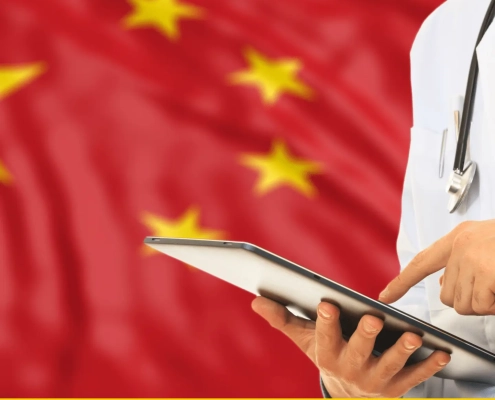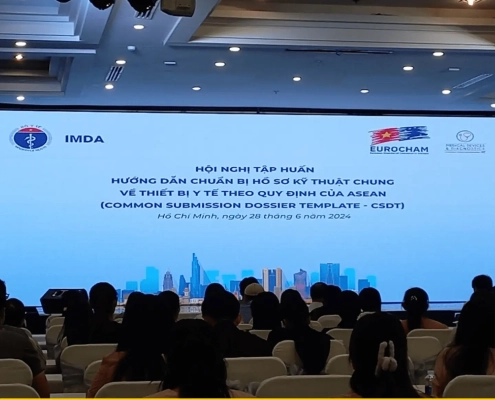Come grow with us in the US in Thailand in China in Korea in the Philippines in Taiwan in Hong Kong
Contact Us
US: +1 512 898-9222
SG: +65 8800-3197
EMAIL: Inquiry@asiaactual.com
Thai FDA Drafting New Guidance for SaMD and AI Device Registration
Published on: Sep 18th, 2023
The novel characteristics of artificial intelligence (AI) software cause issues with the medical device registration process in most countries. The Thai Food and Drug Administration (Thai FDA) is working to address SaMD and AI registration in Thailand, most recently by hosting a meeting with interested parties on July, 2023. As holders of several SaMD and AI product licenses, Asia Actual Thailand employees were invited to attend.
We cover a few of the major proposed changes to SaMD and AI regulation in Thailand and what we think they represent in terms of trends in the industry below.
Please click here for the TFDA’s presentation (in Thai) and here to contact us to discuss how this may affect your software device.
What is AI in Medical Device Software?
In order for a software’s AI algorithm to be subject to the Thai FDA’s regulatory guidelines, it must first fall under the set of definition of a medical device.
Consistent with definition in many countries, the intended uses of the device must be for:
- Conducting a diagnosis, prevention, follow-up, therapy, the alleviation or treatment of a disease or an injury;
- Performing the examination, replacement, correction, modification, support, backing or upkeeping in relation to anatomy or a physiological process of the body;
- Life support or rescue;
- Conducting birth control or reproductive assistance;
- Providing assistance in response to, or providing compensation for, infirmity or disability;
- Providing information from the examination of body specimens for a medical purpose or for a diagnosis; or
- Performing disinfection or sterilization of medical devices.
While not formally specified, devices for aesthetic purposes are also considered medical devices and are expected to be registered prior to importation and sale in Thailand.
The sometimes fine distinction between medical devices and lifestyle or wellness devices was not addressed at the meeting. Medical devices status for such boarderline devices may be done in direct consultation with the Thai FDA.
Specific Concerns When Regulating AI Medical Device Software
In medical devices, AI in software must be more closely regulated than other types of AI for algorithms for several reasons. The first is due to its ability to access the personal medical information of patients. Even if the AI can function with anonymized data, there are ethical concerns regarding its ability to pick out individuals based on identifying medical information.
Furthermore, when an algorithm is collecting data from novel situations and using that data to make future decisions, this would count as a clinical trial in other medical situations. It’s unethical for anyone or any algorithm to conduct a medical trial without acquiring the proper consent and approvals from the right groups. For this reason, most medical device AI is not allowed to collect and use new data for its purposes and must rely on previously existing datasets. The Thai FDA will only accept locked AI – that is, AI that looks at previous datasets without adding new data to its algorithm – for medical purposes.
Classifying AI Software Based on Its Use
Similar to guidance issued by the Singapore HSA, the Thai FDA’s presentation shows that it intends to issue regulatory guidance based on how a medical device software algorithm is used and the seriousness of the healthcare situation and how the output data will be used. There are three levels of classification of AI use in medical device software. From lowest risk to highest, SaMD and AI products can:
- Inform: In this scenario, an AI algorithm uses data to look at new information and inform a clinician or technician of what they’re looking at. For instance, if the AI scans an X-ray of a patient’s lungs and points out to a technician any spots of interest that could be cancer or another ailment. AI in this scenario will be classified as Class 1 risk for non-serious or serious healthcare situations and Class 2 risk for critical situations.
- Recommend: If an AI algorithm uses data to look at new information and recommend a diagnosis to a clinician or technician. As an example, if an AI scans an X-ray of a patient’s lungs and recommends that a spot is likely to be a stage 2 cancerous tumor. In terms of risk classification, AI in this category is classified as Class 3 for critical situations and Class 2 for serious or non-serious healthcare situations.
- Act: If an AI SaMD uses data to look at new information and perform a diagnosis on its own, without the review of a clinician or technician. In this example, an AI might scan an X-ray of a patient’s lungs and provide a diagnosis of stage 4 cancer without the review or input of a human clinician or technician. For critical and serious healthcare situations, this type of AI is classified as Class 3 and is Class 2 for non-serious situations.
The Thai FDA also released the below table to help outline how the healthcare situation and software functionality affects the product’s classification.
| State of Healhcare Situation | Significance of Information Provided by SaMD for Healthcare Decision | ||
| Treat or Diagnose (“Act”) | Drive Clinical/Patient Management (“Recommend”) | “Inform” Clinical/Patient Management | |
| Critical | 3 | 3 | 2 |
| Serious | 3 | 2 | 1 |
| Non-Serious | 2 | 2 | 1 |
It’s important to note that currently, the Thai FDA will not accept any medical device AI that foregoes the decision of a human. All medical device software AI processes must include the review of a human clinician or technician.
Considerations for SaMD and AI Registration in Thailand
Based on this announcement and guidance issued from other regulatory entities such as those in Singapore, Asia Actual expects the following to be true of the new guidelines for medical device software AI regulations in Thailand.
Risk Classification
The Thai FDA’s announcement indicates that all medical device software will fall into levels 1-3 of their 4-class system, depending on its characteristics and the developer’s claims. You can find more about the risk classification guidelines here.
Expert Review
At this time we expect any claim of AI in software to require expert review, which will mean review by a third-party expert locally in Thailand as well as an additional fee and an extra two months for review. This may be different if the reviewer determines that a manufacturer or licensee’s documentation is particularly excellent and they are already familiar with the AI in question. Also, any device that has been reviewed and approved in Singapore may be exempted for an expert review in Thailand, as per the Singapore Reliance Program.
Change Notifications
Any major changes to software with an existing license will require at least an amendment and sometimes a new registration depending on the changes. In the latest announcement, the Thai FDA provided some guidance on when to amend software as a medical device. For instance, minor updates such as updating the home menu or customer experience will not require a change notification, while major changes, like those made to the AI algorithm or the inclusion of a new dataset, will require a change notification.
Documentation Requirements
As with other medical device regulations, software is held to a specific standard of risk analysis and software developers must submit essential proof that they did a quality review of the software. This includes proving that the design followed the development lifecycle management approach. These standards are not unique to Thailand, and if software is registered in the United States or Europe, the same requirements will stand.
Labeling
As with all medical devices, labeling for medical device software using AI is very prescribed in Thailand. Thailand requires all products to display the local registration number on their labeling as well as the local importer’s information. This label will also include the software version, which if updated, may trigger a change notification if significant enough.
Draft Recommendation Upcoming
While there is no set date for the release of the draft recommendation, Asia Actual is in regular contact with the Thai FDA regarding the announcement and will, as always, be on the lookout for any changes and clarifications. You can view the presentation outlining the new draft guidance here and stay up to date with new regulations released by the Medical Device Control Division here.
Contact Asia Actual for More Information
Explore the new guidance on SaMD and AI device registration in Thailand with Asia Actual’s expert help. Our local team in Bangkok can walk you through the registration process for your specific software or medical device and help you prepare for any upcoming changes.
Stay Up to Date with Us
As always, Asia Actual is committed to keeping abreast of these latest developments to monitor how they’ll affect our clients’ ability to more quickly and effectively apply for medical device registration in Thailand.
Our Bangkok office is staffed by experienced, bilingual regulatory commercial professionals. Contact us for more information or to explore your market access options in Thailand.
Asia Actual is a regulatory consulting company focused on helping manufacturers grow sales in challenging Asia markets through device registration, independent license holding, direct fulfillment, and a variety of sales channel support services.





